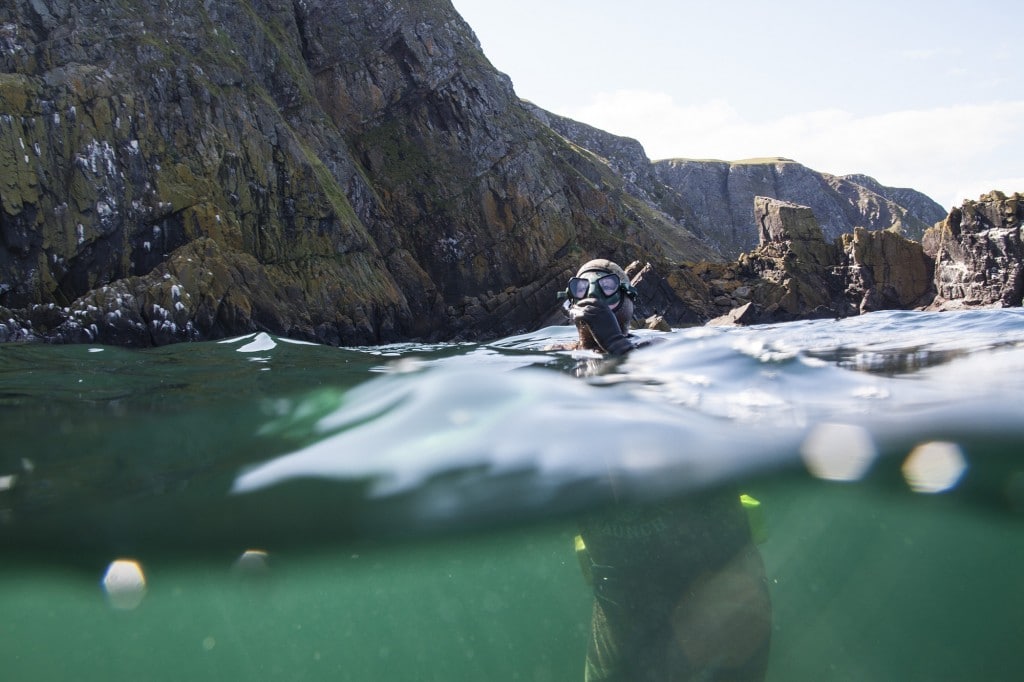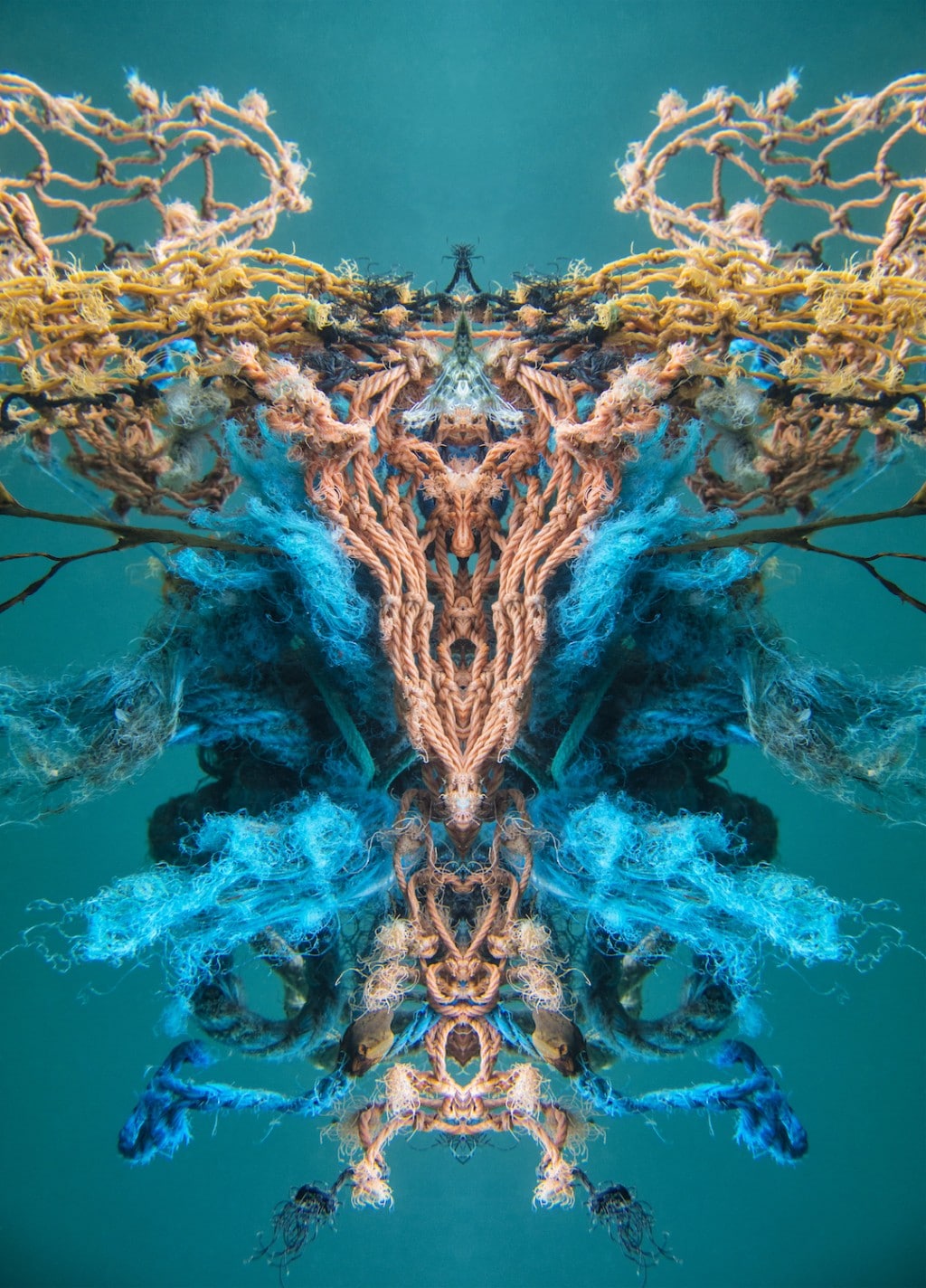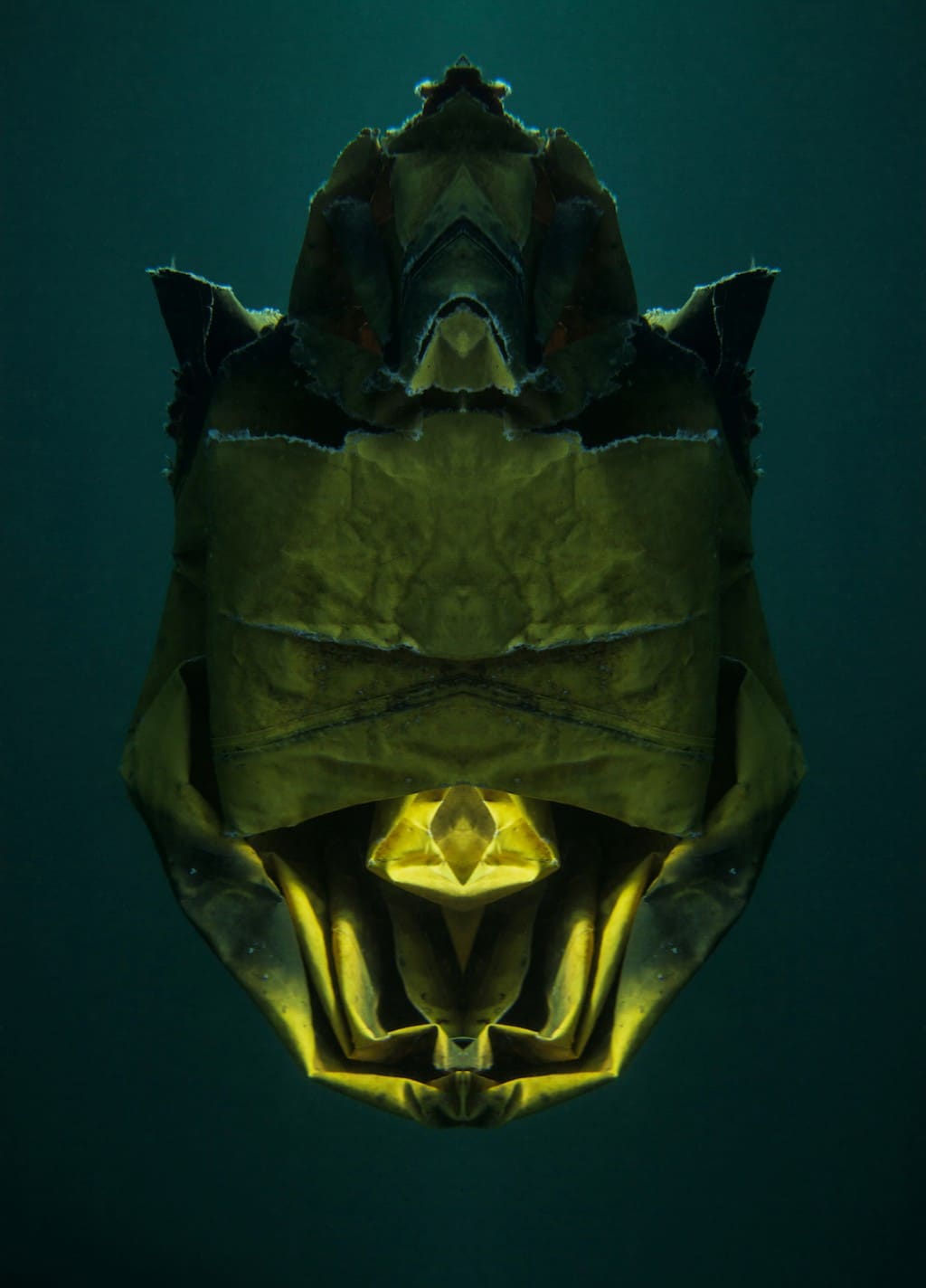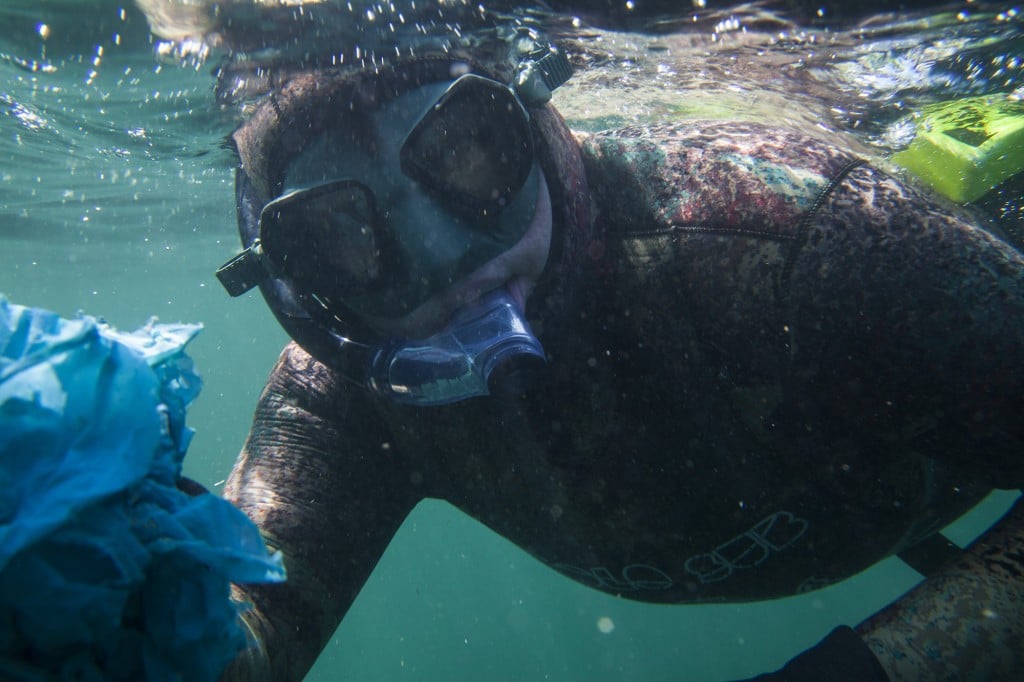Marine Life & Conservation
Exhibition: Above, below and beyond by freediving photographic artist Janeanne Gilchrist

Janeanne Gilchrist is a photographic artist and image-maker. She was born and brought up in Edinburgh and graduated from Napier University in 1996 with a BA (Honours) in photography and film.
The sea and the self: these are territories Janeanne Gilchrist explores and merges seductively in this exhibition of intricately composed and infinitely ambiguous sub-aquatic images.
She forages for objects in the depths – a tangle of fishing net, a singed seaman’s sou’wester, discarded fish gut, a decomposing plastic bag – the thoughtlessly discarded cast-offs of fishermen and of man. She searches out subjects – the spawning seaweed, the mesmerizing alien glow of a jellyfish, the stone washed bones of a migratory bird.

Structuralism
The work is made to provoke, and it will be criticized for turning rubbish into art however what it aims to do is raise the debate further about the state of all our waterways across our land and beyond.
Having dived around Scotland for the past 10 years she is trying to share an experience of what she has found and how to communicate this in a more powerful way. Receiving the J.D Ferguson Art Award has given her the opportunity to explore and create this body of work to highlight environmental issues.
A big problem is that by the time this waste is washing up on the shore, the damage is already done and we are only dealing with the fall out. As Janeanne says:
“What we’re doing — cleaning up our own mess — addresses just a symptom of the problem, not the problem itself”.
The work explores subconscious emotional memories and otherworldly fables and folklore. It also features found items that had a place, a function, a use, in one world, which are now abandoned, adrift and discarded, in another world in which they take on an ethereal distorted temporal beauty, dissolving and breaking down into the aquatic environment.

Anthropomorphism
The process of developing this work has come through observation and years of devoted water time, evolving study and exploration.
Janeanne has been lucky enough to find a partner, a soul mate, who was responsible for taking her on her first ever dive expedition to Egypt and diving Ras Mohammed. Those first few dives of breathing in air from a regulator underwater and trusting the heavy equipment kept her safe, and was her first step into another dimension to explore a remarkable water world.
Back home in Scotland, the need to wear dry suits and even more weight always made her feel awkward and anxious, checking dials and opening valves distracts from the whole experience and reason for being there. Her quest was to be in the moment, in the water, to lose herself. To focus on just herself and her surroundings. To meditate, breathe and become one.
So she learnt to freedive…
“To free dive is the most amazing sensation. Mastering your fear and hanging silently suspended in the blue/green of the sea, in gin- clear water, in glass-like conditions, is a spiritual experience.”
Janeanne combines her environmental underwater working practices to develop a new body of work based upon the intersection between scientific illustration, still life painting and technological advancements, experimenting with botanical imagery and the iconic visuals of fantasy to capturing organic and non-organic matter.
Janeanne seeks to discover moments, textures and stories. She fragments, manipulates and then reinvents the image into a new entity which resembles the original, but is, in fact, entirely contemporary. She rebuilds these new pieces of work, swaying between reality and surrealism in a moving composition.
“This work can’t be reproduced. It is completely unique. Capturing these moments while free diving in challenging conditions in the waters around Scotland isn’t easy. The current is playing with them and with me, the entire time – I am trying to capture something that’s never going to be in the same location, same light, same position, ever again.”

Janeanne goes on to say:
“Unlike surfing or any other action sport, free diving is not all about swimming fast or expelling a lot of energy. It’s more to do with clearing your mind, finding your internal flow state, completely relaxing, calming yourself, focusing on your breath and enjoying the trip… and anyone can do it.
Humans are one of the few species that share the mammalian dive reflex, same as seals, dolphins and whales. We (everyone) has the natural ability to hold your breath for two minutes. It’s very easy to learn, but to push over the two minute mark, that’s where the discipline and training comes into its own. Swimming regularly practicing your technique, a good clean diet and yoga helps.
Best of all, we have found that the Free diving has helped in other parts of our life especially with surfing or as a coping mechanism for dealing with stressful situations in general. It teaches you to always take a deep slow breath, step back and relax the heart rate. I would encourage everyone to do a free diving course after a few short training days to give you the tools and techniques to practice safely. It’s the best way to unlock your potential in a safe environment. I did my course with Steve Millard of www.learn2freedive.com.”
When Janeanne is not on her aquatic journeys, She works in partnership with her partner Will Beeslaar running Staunch Industries Design, a small independent design studio and lifestyle brand based in Leith, Edinburgh.
Above, below and beyond by Janeanne Gilchrist is at the J D Fergusson Gallery in Perth, Scotland from 18 November to 24 March 2018.
Catalogue photographs – Janeanne Gilchrist
Artist portrait photograph – Will Beeslaar
Creative Image Retouching – Will Beeslaar
All images are copyright with the artist www.janeannegilchristartist.com
Follow Janeanne’s work at:
- www.janeannegilchristartist.com
- www.behance.net/Unit-photographic
- Social – Instagram – janeannegilchrist
- https://staunchindustries.com
- http://staunchdesignstudio.com
- Twitter – @Staunchsurf
Marine Life & Conservation
Go Diving Show 2025 UK Stage Speaker: Lloyd Rees-Jones

Sharks dwell off the UK coastline, but did you know there is one that glows in the dark? Join Lloyd Rees-Jones at this year’s GO Diving Show in March when he takes to the UK Stage to showcase a very different side of our marine life when viewed in a different light (no pun intended!).
Lloyd Rees-Jones is a HSE Part 4 Media Diver, PADI Master Scuba Diver Trainer, underwater videographer and seasoned volunteer with Neptunes Army of Rubbish Cleaners (NARC). For almost 20 years he has been completely captivated by three shore diving locations in Pembrokeshire, West Wales, and every year he discovers something new that fills him with excitement for the season ahead and keeps him going back year after year.
Ultraviolet night diving in Pembrokeshire
Lloyd’s talk on the UK Stage will be about marine fluorescence and the nocturnal activities of our favourite coastal species, and will give a glimpse on how ultraviolet night diving has the potential to rekindle our passion for night diving – and also the hidden benefits it can bring to our UK diving adventures.
Go Diving Show 2025 takes place at the NAEC Stoneleigh Park, Coventry, on the 1st -2nd March.
Marine Life & Conservation
Go Diving Show 2025 UK Stage Speaker: Roisin Maddison

Underwater photogapher and avid UK diver Roisin Maddison will be taking to the UK Stage at the GO Diving Show in March to discuss why she loves diving off our coastline.
Roisin will be talking about her passion for our native species, UK diving and why it isn’t just deep, dark and cold.
Go Diving Show 2025 takes place at the NAEC Stoneleigh Park, Coventry, on the 1st -2nd March.
-

 Gear Reviews2 months ago
Gear Reviews2 months agoGear Review: SurfEars 4
-

 Marine Life & Conservation2 months ago
Marine Life & Conservation2 months agoPaul Watson Released as Denmark Blocks Japan’s Extradition Bid
-

 Blogs3 months ago
Blogs3 months agoExperience Malta and Gozo in 2025: A Paradise for Divers and Culture Lovers
-

 News6 days ago
News6 days agoHumpback Mother and Calf Win Underwater Photographer of the Year 2025
-

 Blogs3 months ago
Blogs3 months agoJeff Goodman Launches Underwater Moviemaker Course with NovoScuba
-

 News3 months ago
News3 months agoDive into Adventure: Limited Space Available for January Socorro Liveaboard Trip with Oyster Diving
-

 News2 months ago
News2 months ago2-for-1 tickets now available for GO Diving Show
-

 News2 weeks ago
News2 weeks agoFilming 360 in The Bahamas



